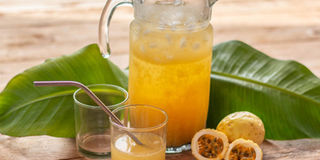Keep your fruit juice safe from contamination

When you leave your juice uncovered, the bacteria is likely to get into it which will cause food poisoning. Remember to store in in a clean covered container.
What you need to know:
- For many people, the festive season is incomplete without lots to eat and drink. And since healthy living is high up on many people’s lists these days, fruit juice is a common choice for many. Here’s how to keep juice safe for consumption.
Fruits such as apples, citrus fruits, mangoes, pears, grapes, pineapple, melons, berries as well as vegetables like carrots, beetroots, celery, cucumber, kale or spinach can make very good and healthy juices. However, some people complain that the fruit juices are not that safe and can cause food poisoning.
Food poisoning
According to Amanda Tumwebaze, a nutritionist, mixing many fruits to make juice is not the cause of the food poisoning from juice as some people claim.
“The mixing of fruits or vegetables is not the problem. The viral or bacterial contamination usually comes from the mistakes made during the extraction process,” she says.
Fresh fruits
It is important to check and see if the fruits are fresh enough to make good juice. The juice can only be as good as the fruits and vegetables you use.
“Juice is a good way of getting the right nutrients in your body but if you are not careful, then you will also consume pesticides and other harmful chemicals. It is, therefore, important that you buy fruits that are organic and remember to wash them thoroughly,” Tumwebaze says.
Storage
Fruits that have mould growing on them or even becoming rotten are not recommended for juice. Ann Male, a chef and mother advises that if you buy fruits in bulk, ensure to store them well to prevent the growth of mould which is likely to cause food poisoning.
Hygiene
“Also remember to wash the fruits before you start the extraction of juice irrespective of whether you are using a juicer or blender. This will limit the level of contamination from the bacteria or virus that may be on the skin of the fruits,” Male says.
It is also important to remember that some fruits are very sensitive and once exposed to air become oxidised.
Therefore, juice from fruits such as water melon, pawpaws and jackfruit should be consumed as soon as it is made or it will developing foam, sour taste or even develop a foul smell if it is kept for long.
Honey addition
Tumwebaze says, “Some people add honey to their juice because of its antibacterial properties but when you do this, ensure to take the juice within a day. This is because the honey accelerates the fermenting process and once left to stand for long, the juice can become alcoholic.”
The equipment
The equipment that you use to make the juice plays a big role when it comes to hygiene.
First of all, the person making the juice should be as hygienic as possible. Even a bead of sweat falling into your juice while you are making it can cause food poisoning.
“Your juicer or blender should be well cleaned before you start the process. After juicing, wash the juicer thoroughly. Do not keep it and wash it when you want to make juice again. This can cause a buildup of bacteria on the juicer or blender and health concerns thereafter,” Male stresses.
Boiled water
It could be about the water that was not boiled well. Ensure therefore that the water you use to make juice was boiled. Transfer the juice into a clean and dry container. Avoid putting your drinks in utensils that are still dripping with water. Dry the jar with a dry and clean towel before transferring the juice.
Cross contamination
Male advises that if you are to store the juice in a fridge, put it in a section of the refrigerator where it will not be in contact by raw foods.
“If you store the juice next to raw foods such as cabbage, meat and poultry in the fridge, cross contamination is likely to happen. Bacteria can be transferred from the raw foods into your juice,” says Tumwebaze
Also, when you leave your juice uncovered, the bacteria is likely to get into it which will cause food poisoning. Remember to store in in a clean covered container.




